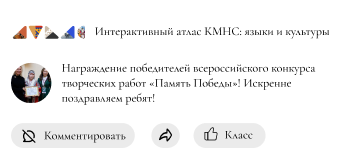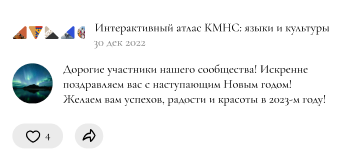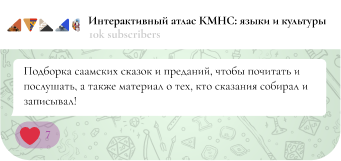Modern culture and crafts, folklore groups, professional art
The “Tree of Life – Elon Pu” celebration has become a symbol of cultural renaissance in the Leningrad region. It takes place annually on the second Sunday of June, most frequently at the village of Vinnitsy in the Podporozhye district of the Leningrad region. It is a regional Veps holiday and boasts the largest attendance among ethnic holidays in the entire Russian Northwest. Illustrated playbills, booklets, flyers, including those in the Veps language are printed for every celebration and announcements are posted on the website. The first “Tree of Life” celebration took place on June 14, 1987 in the village of Vinnitsy. The celebration features contests for the best ethnic dance performance, best ethnic costume, a talent show, an ethnic crafts fair, and The Veps beauty pageant.
The Veps Culture Society (hereinafter the Society) is very active in positing and resolving all issues in the Veps’ ethnic development. From the outset, the Society has clearly set forth its priorities: re-creating the Veps writing, reviving the Veps language and culture with schools being the driving force behind the revival; promoting socio-economic development of the Veps’ settlements, and legally enshrining the Veps’ status as a small-numbered indigenous people of the North.
Nina G. Zaitseva and Maria I. Mullonen authored the first Veps textbooks and dictionaries. Since 2007, Nadezhda Petrova (Kukoeva) and Marina B. Giniyattullina have been working on a new generation of Veps textbooks. Since 1989, Karelia holds regular courses for Veps language teachers. Ethnographic films in Veps (by Larisa Chirkova, with Vladimir Slavov’s cinematography) are very popular with film audiences. They made three films: “Živatad vepslaižiden elos” based on Irina Yu. Vinokurova’s book on animals in Veps life, “Vepslaižen kodin sudain” (“The Life of the Veps Home”) based on Zinaida I. Strogalshchikova’s book
Traditional House of the Inter-Lake District
, and “Sel’ ktas vedes kala kokib” (“The Fish Bites Well in Clean Water”) on the traditional fishing. Many people learned about the Veps thanks to the music of the Noid folk band led by Vladimir Soloviev. The band performs at various events ranging from village holidays to the Days of Related Peoples in Estonia.
Today, there are about 20 Veps folk performing groups including the
Armas
Veps folk ensemble,
Varasta, Randaine, Kastkuine, Linduized, Anna Tulla, Iyastun, Kelloine, Kodirandeine, Oeine
, and
Pyaiveine
performing groups, the Veps Folk choir and children’s folk ensemble
Chomashti
and the ensemble of the Pyazhelka school. Some folk performing groups have been granted the status of “people’s performing groups of Russia” and have been winners and runners-up in various competitions. The Veps also have the
Gyogut
and
Zoriaine
performing groups,
Ikhyastuz
Veps folklore club, and
Peiveine
Veps puppet theater.
Since 1998, the village of Vinnitsy has a Veps folklore center that is engaged in preserving and developing Veps culture, teaches the Veps language, holds exhibitions, assists in organizing performing groups’ activities, and amateur organizations. It has an auditorium with the capacity of 49 people, a puppet theater, a weaving and sewing workshop, a room for master classes in baking, a museum, and a locksmith’s workshop. They offer Veps language classes for all ages, tours, master classes, concerts, traditional Veps crafts exhibitions.






















































